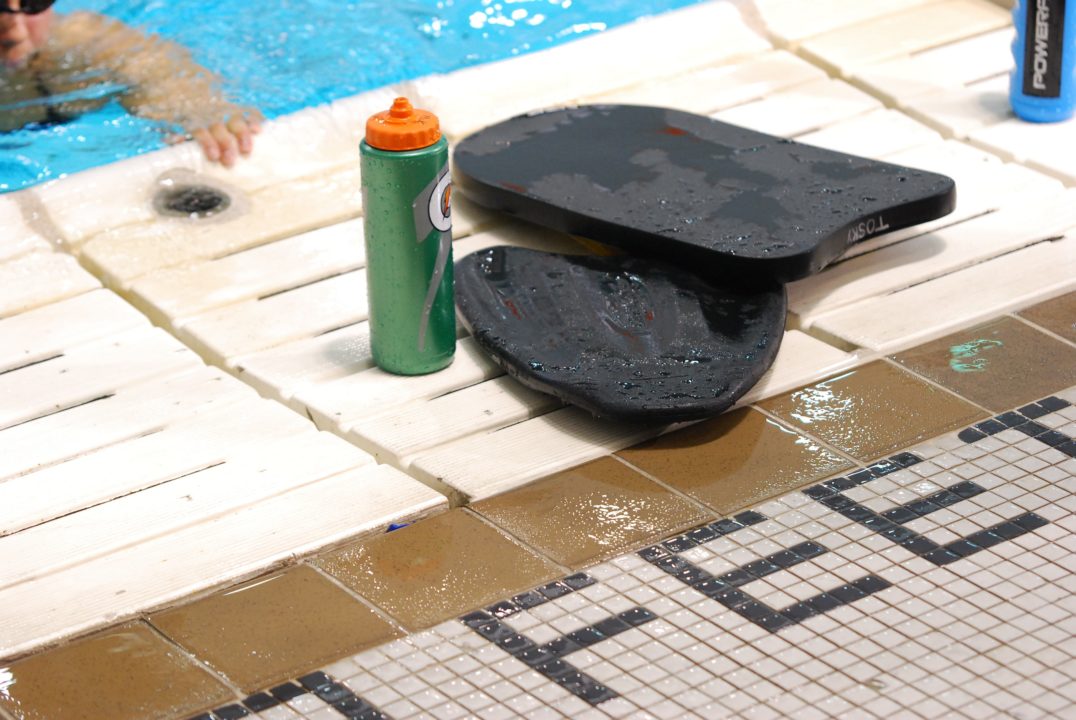A sports-related study’s findings recently presented at the UK’s Royal College of Pediatrics and Child Health’s annual conference may have you re-thinking what you’re putting into your on-deck hydration bottle.
In the first randomized, blinded, controlled trial of its kind, researchers led by Dr. Graham Briars, Consultant Pediatric Gastroenterology at the Jerry Lind Children’s Hospital, specifically studied sports drinks’ effects on swimmers across multiple workouts. Their findings? Drinking sports drinks prior to competition rendered no benefit in performance in non-elite athletes.
Within the study conducted over 12 separate 75-minute swims, swimmers aged between 11 and 17 drank either sport drinks, water, or no drinks at all after which they performed 10 x 100m maximum effort freestyle sprints at 3 minute intervals.
Using electronic timing equipment, data was gathered and analyzed from 1118 swims. The following summarizes the findings:
- Sprint times were overall .027 seconds faster after not drinking anything than after drinking
- Times clocked after drinking water were .151 seconds faster than times clocked after drinking sports drink
- “Drinking sports drink or water over 105 minutes of sustained effort swimming (typically 3,300 to 4,200m) has no benefit on swimming performance in a non-elite athlete population.”
As a result of the study’s findings, researchers concluded that “sports drinks can be considered as sugar sweetened beverages.”

How much did they drink??? Did all assigned subjects drink the same sport drink??? Did science people measured blood sugar???? Were the subjects of the same age and gender???
Tip: Research and read up on the option of going paleo. Get your body to burn fats, not sugars. This is not easy in terms of household meals, but drag mom and dad there with you and you’ll all be with more energy over the long haul. It takes some time to adjust, perhaps 30+ days.
Then, there is no way the paleo athlete is going to drink nor want the sugar drink(s).
Since the athletes swam ten repeats I’d be curious to see how the data looks on the latter swims when the swimmers were fatigued. My assumption is there wasn’t an appreciable difference, but it’s not explicitly stated.
Clearly, there are other reasons to drink sports drink. Like trying to keep some weight on a 13-14 that swims for two hours, then lifts (or does two-a-days) We do “healthy” calories everywhere we can, but if I can give him 80-100 calories a day in sports drinks, that’s a win for us.
I picked up on the “performance in non-elite athletes”. I have one elite athlete, one bordering elite and one non-elite (i.e. very young). Most of their performance is how they decide to show up to practice that day, rather than what is in their water bottle. It is a well known fact that carbs need to be added after 1hour of strenuous workout especially when they have zero fat to available to burn.
**Ahem…. cough, cough…. zero carb is optimal… cough, cough**
Sugary drinks block the ability to effectively burn fat. This blocks athletes from training to create an advantage by adapting to burn fat at higher intensities, thus forcing athletes to face the deleterious effects of lactate accumulation to a higher degree and earlier in the course of a race.
Eat meat. Drink water.
Eat meat, drink water? That is some terrible nutrition advice. During intense competition, the body relies on glycogen/glucose for fuel. Fat burning, and being in a ketosis state is not something I would ever recommend to my swimmers.
He tried to say that you should eat real food, not some processed “Energy” drinks which are full of useless sugar.
I know next to nothing about the effects of carbs, fats, or protein on swimming performance, so I just want to clarify:
Are you saying that adapting to burn fat as an energy source for races is BETTER than using carbs as an energy source?
It is more complicated than that, but YES.
10×100 @3 is a terrible analogue for competition.
I was under the impression that after 90min of workout you need to start replacing depleted glycogen stores. Seems like the time was too short in this study.
Maybe, maybe not. It IS becoming common knowledge about the deleterious effects of (excess) refined sugar consumption on human bodies. Yet, regardless of that, something of importance that has not been considered is the psychological side: having the feeling that the stomach is not empty helps some swimmers & hinders others. For example, then & now, I could really never eat much if anything before a workout (stomach simply would not take it – diaphragmatic cramps as well as bloated & heavy feeling plus want to throw up). I work out hard. Yet conversely, some swimmers I have coached could not practice or swim in a meet without a full belly meal, & they were skinny as a rail. This… Read more »
There has also been research on a mouth rinse, simply swishing sports drink around in your mouth. However, there are certain circumstances as this article states that could contribute to positive results..
https://www.ncbi.nlm.nih.gov/pmc/articles/PMC3916844/
deleterious!! Really… people still use a thesaurus?
Yep, totally agree! My son was in the group that needed to be full to swim well, and my daughter like you, feels sick swimming with anything in her stomach.
We have 90 minutes of stored Glycogen. We must refuel withinva 30 minute corridor.
I completely agree that is what I thought when I saw this. Plus what classifies as elite? Typically studies classify athletes as trained or untrained(given years/intensity of training), what are these athletes training age?
I am not saying this study is wrong, but it isn’t nothing new. Plenty of research shows that there is no need for sports beverage if the intensity is too low or the length of time is slim.
They train about six times a week for a number of years.